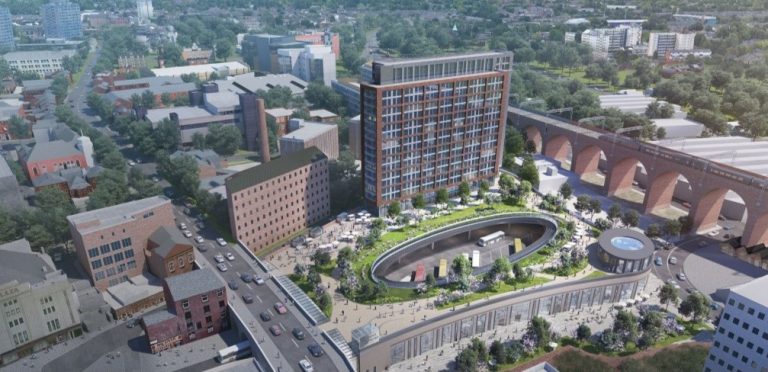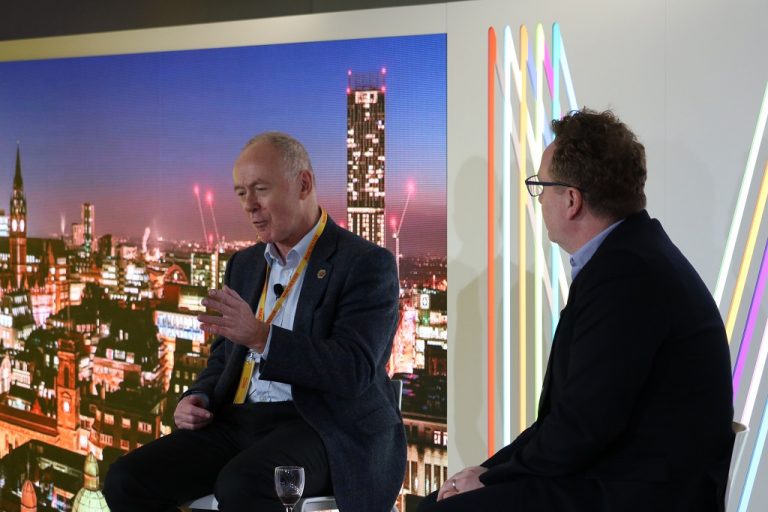During a MIPIM set against a backdrop of continued political uncertainty, Place North West met with Greater Manchester Mayor Andy Burnham and council leader Richard Leese, to discuss Greater Manchester Spatial Framework challenges, delivering housing numbers, local politics, and Brexit.
Andy, kicking off with the topic on many Manchester property professionals’ minds, as the GMSF consultation draws to a close.You stuck to your promise of rewriting the Greater Manchester Spatial Framework, but is it ambitious enough?
“I think the GMSF supports ambitious levels of growth, I don’t agree with suggestions that it doesn’t support enough growth in the Northern boroughs, there are plenty of prominent, strategic sites. It’s less scattered than the previous version, and clearer about opportunities. It’s delivering higher ambitions, in fewer, concentrated areas.”
A £50m housing deal from Government was allocated based on the City Region delivering ambitious housing growth. With the target dropped from 227,000 to 201,000, is Greater Manchester having to renegotiate?
“We’re in discussions with Government, but we’re getting a lot of mixed messages. Civil servants are uncompromising, saying that we have to stick to a greater number, in fact we’re under pressure to raise the numbers even more. Meanwhile, the housing minister [Kit Malthouse] stands up in Westminster Hall, and says it’s all down to us to decide.
“It’s not consistent, the methodology says one thing, then regarding the housing deal they say something else. The Government needs to be straight with us, so we can be straight with the public.”
If the hard line is stuck to, would Greater Manchester revise the GMSF, or stick to its guns and lose the funding, despite its importance in helping to deliver brownfield sites?
“We’d have to see. Civil servants may say one thing, but when the Housing Minister gets involved that line might change.
“If the housing minister wants us to not have pressure on our Green Belt, then he has to help us do that.”
It’s on the shoulders of Manchester and Salford to deliver the bulk of Greater Manchester’s housing numbers in the GMSF, having taken allocations from the other eight boroughs. Is he confident they can deliver, as if not the crux of the plan could fall apart?
“Yes, I’m confident, because of the way we’ve delivered numbers so far. Transport across Greater Manchester needs improving, but Salford and Manchester are very well served, so that also means we’re not building for the car. And that would be my message to the development community, we’ve got to stop building for the car. Congestion in this city is becoming a reputation issue.
“It’s not the old process of the easy sites, we’ve got to see the property industry embracing the Town Centre Challenge and building near transport hubs.”

The Town Centre Challenge was launched at the end of 2017. Is there money to fund any projects proposed?
“There’s a lot of money around which can flow into towns. The Government has just launched the Stronger Towns Fund, there’s the High Street Fund, which we’re bidding for, there’s Chris Boardman’s cycling and walking funding, so the major issue is not funding necessarily, but is about gathering people around a vision.”
Given the current political climate, and the nature of Brexit still uncertain, what future is he preparing for?
“I’m open to all eventualities right now. It’s unpredictable, and there could be all sorts of results including a leadership contest within the Conservative Party.
“It’s very difficult, the Government is not talking within itself, and everything is taking a long time. To give a sense of perspective on just one issue, we’re still waiting on money for the moorland fires which occurred last summer. The basics are not being done.
“We’re dealing with very difficult stuff and it feels like we’re battling it alone. But we need to keep getting the message out, that the country may look lost, but we’re not. Greater Manchester knows what it wants to do. There has to be more devolution, and the case is being made even stronger by the chaos currently going on in Government.The old ways just won’t work.”
The mayoral elections are not far away, in May 2020, so what’s the main issue he will be shaping his campaign on?
“Homelessness. That will be the test of devolution, and how much we’re allowed different ways of thinking. I’m proud that we’ve seen the first fall in numbers of homeless, which have been rising rapidly, so we’re achieving a reduction. It’s an incredibly complicated issue, and I want to get to a point where we don’t just get people off the streets, we give them a home that they actually want.
“My initial promise was around rough sleeping, which we can do something on more immediately. We’re going to come back with our second version of the Bed For A Night, and by May 2020 I’m confident that I will have overseen a dramatic change to our thinking in regards to the homelessness issue.”

Richard, the debate around affordability of housing in the city centre is happening increasingly often, and is a particular sticking point for the Labour Group of which you’re leader, so what’s your position?
“Some people are presenting housing issue as an either/or, that the private sector shouldn’t be building apartments in the city, they should only be building social housing. All around the city centre, it’s workers housing, we have baristas to software engineers.
“It’s not what we are building, it’s what we’re not. We’re stuck in an affordable housing debate, while low income families on housing benefit can’t get good quality housing in the private sector. So that means social housing, which means subsidy. We need 5,000 units, which would need roughly £400m of subsidy. We could raise some of that out of using our own land, but really social housing needs Government support.
“Rents are going up in the city, but as supply is increasing, that increase is slowing down, and that’s a good thing. But other prices are going up too, so all these families we’re talking about, we need to ask, is the city centre a place they would want to live anyway.”
Manchester needs to develop a large number of homes to meet the GMSF requirements, as well as pushing for more development as an income-generator through rates receipts. However the outcome of planning committees has become unpredictable and significant projects are being rejected or deferred – is there a clash between the politics and the city’s growth plan?
“We rigorously follow the law, so the committee is free to make up its mind in whatever way they see fit. There’s now of viability to deliver 20% affordable units within a scheme, but the challenge still is that some members think developers make huge amounts of money, and have been withholding profit, however the city centre has only just moved beyond being marginal. Now, it is more viable to get contributions, but that wasn’t always the case.
Where are the next development areas to watch in the city centre?
“We’re not done yet, there’s still scope for continuing development around the city centre for residential, and there’s very high demand for commercial, which is great as it means there is demand for jobs. There’s a lot more we want to develop in North Manchester, up to Beswick and beyond. In places like Angel Meadow we will continue to see high density, high rise, moving to lower density around Collyhurst.”
From the future of the city, to your personal future. Will you be standing again in the next local election, and what’s your response to speculation that you could step down from the council mid-term?
“Local elections were only last year, I still have three years to go, and three years is a very long time.
“I would never quit mid-term, stability and continuity is very important for the city, and I have no desire to fundamentally change the trajectory of the city.”
Similarly to what I’ve asked Andy Burnham, what’s your approach to guiding Manchester through the current political and economic uncertainty?
“We’ll do waht we did in the recession, what we did after the Brexit referendum, what we’ve done in the past decade, which is to continue to build a modern Manchester, and project ourselves as a modern, international, inclusive city.”
Source: Place North West, March 15, 2019


